How To Live Off The Grid In A Van – The Ultimate Guide
If you are interested in living the van life or travelling in a van then you’re probably wondering how to live off the grid in a van. Living off the grid has so many advantages when it comes to living an outdoorsy, adventurous lifestyle as it means you can disconnect for longer and explore the wilderness without needing to rely on outside resources. Off grid living also helps to keep van life costs down as your tiny home is more self sufficient and efficient.
There are so many great van life ideas, tried and tested by many vandwellers, that will make your off grid adventure a little easier. Alternative living and living in a van off the grid doesn’t have to be difficult, as long as you know what you’re doing and what you need to be able to make things run more smoothly. So throughout this article we’re going to give you some simple hints and tips so you can learn how to live off the grid in a van.
Itching to try out Full Time Van Life? Want to reveal to the world that you’re a weekend warrior? Head over to our brand new Facebook Group! It’s a place to pick up vanlife tips, share ideas, and meet other van life enthusiasts from around the globe!
What Does Living Off The Grid Mean?
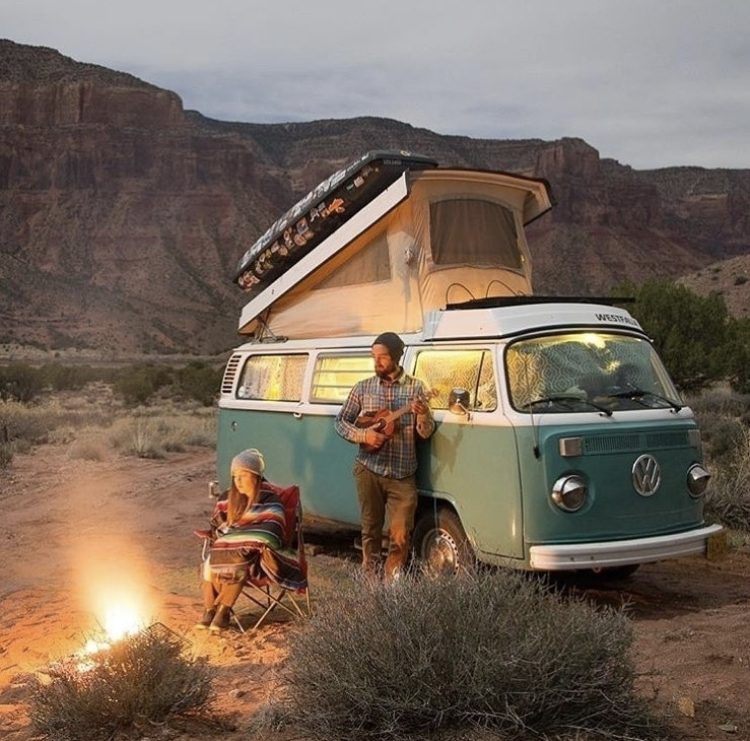
But, wait a second, what does living off the grid actually mean? Well, before we dive into our hints and tips on how to live off the grid in a van we’re going to answer just that for you. In simple terms off grid homes aim to become autonomous, meaning they do not rely on their areas water supply, sewage system, gas or electrical power.
There are many benefits to living off the grid and becoming self sufficient, the main one being the benefits to the environment. By disconnecting from the mains power supply, gas supply, water and sewage you are saying no to the often polluting processes that deliver these conveniences to your home and taking control of your own carbon footprint. Living off the grid can also be good news for your bank account once all the systems are in place, as you would no longer need to pay monthly bills. However, becoming an off grid household can be expensive.
To be completely off the grid and not rely on any of these resources is difficult and is usually a process. This becomes even harder when travelling in a van as their is no home-base to set up process to become self sufficient. In this article we’re going to talk you though ways to work towards becoming autonomous but just remember that every little helps and even becoming self sufficient in one area is good news for the environment.
Living Off The Grid
Being off grid in a van also means relying less on services such as laundrettes, campsites or swimming pools for showering, good news for those with an adventurous spirit. There are several areas in which you can work towards living off the grid while travelling in a van which we’re going to break down for you now.
How To Live Off The Grid – Electricity
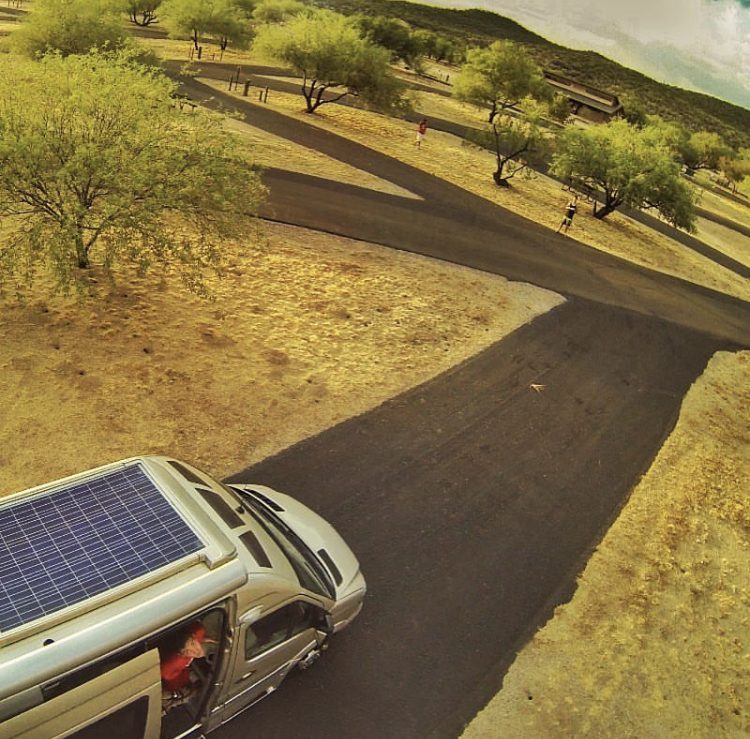
First up on our list of how to live off the grid in a van is electricity. Disconnecting from the mains power supply is the best way to reduce your carbon through becoming an off grid house (or van!) hold. And, luckily for us this is actually the easiest one to do while living in a van. You may be thinking that by moving into a van you are already disconnecting from the mains power supply but, if you rely of campsites to charge your leisure batteries then you are actually plugging into mains power to do so.
The easiest way to avoid needing to plug into the mains power supply at campsites is to install a solar electrical system to your tiny house. Installing a solar system means that the electrics in the living space of your camper van would be charged from the suns rays. This is great news if you’re travelling in warm and sunny climates however, if you’re worried about those try days you can also install a split charge relay which enables your leisure batteries to charge while the van is running. Of course, the diesel or petrol needed to run your engine doesn’t fall into the category of living off the grid but feeling your vehicle up is simply unavoidable.
Benefits of a Solar System
Installing a solar system is not only good for environment but also for your bank account. As there is no need to go to a campsite to charge you batteries you will be able to wild camp and save the campsite fee. This means your adventure will be able to continue even longer. Wild camping, or boondocking if you’re in America, also leads you to amazingly beautiful places and allows you to disconnect and truly spend time in nature.
Furthermore, as you do not need to worry about charging your batteries with a solar electrical system you are not limited, in this way, to how long you can stay in the wilderness. By disconnecting from the mains power system at campsites you can allow yourself to stop thinking about how much power you have- whenever there’s sunlight your batteries are charging! This simplifies van life and allows you to relax.
How To Live Off The Grid – Drinking Water
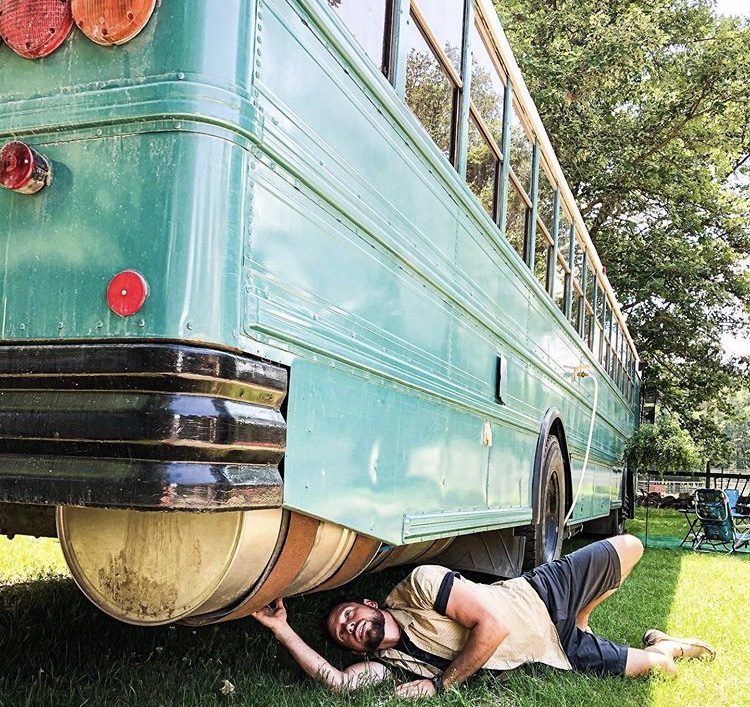
Next up on our list of how to live off the grid in a van is drinking water. To disconnect from the main water system is more difficult than disconnecting from the grid’s power supply. With a static tiny eco house or any household that is aiming to live off the grid water supply would usually come from a fresh water source or a large water collection system. A fresh water source could be in the form of a stream, well or bore hole and water collection systems usually collect rain water.
However, as traveling in a van means you are on the move most days, none of these systems would work. The only way to avoid replying on the mains water supply is to add a water filtration system to your van. A water filtration system means that you can fill up your vans water tank from any lake or stream and have safe drinking water. However, a full water filtration system can be fairly expensive.
The larger your water tank then the less often you will need to fill up your tank, allowing you to stay off the grid longer. This is a good alternative if you cannot afford a high tech filtration system. This may not reduce your carbon footprint in terms of where you water is coming from but it will allow you to adventure for longer. If you cannot have a filtration system, reducing water usage is a good way to help the environment and this is often done by living in a van as you need to be more conservative with your water to ensure it does not run out.
How To Live Off The Grid – Showering
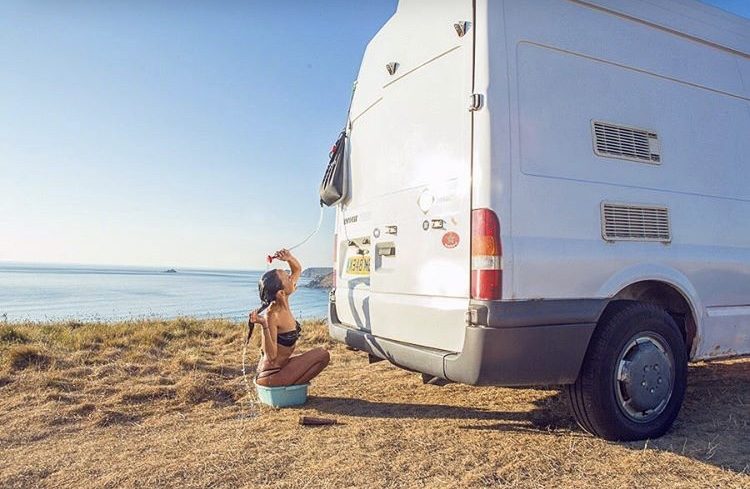
Next up on our list of how to live off the grid in a van is showering. Showering and staying hygenic is really important but, if your camper does not have a shower, it can be difficult not to rely on campsites, gyms or swimming pools to do so. There are several shower without visiting these resources that we’re going to highlight below.
In The Great Outdoors
If you live in a van or have spent any time traveling you’ll know that you spend 80% of your time outside anyway, so why not use this to your advantage and wash yourself outside? Freshwater sources such as rivers, lakes and waterfalls are great places to have a dip and a rinse off. If you have eco friendly shampoo and soap then this can be used outside too. However, it’s better to fill a bucket and use ashore, as even eco friendly soap can be bad for the plants and animals living in the water. Many beaches also have showers avaliable so you can clean off the salt water, however soap is often not allowed.
Camper Showers
If you’re in need of a ‘proper’ shower then a camper shower such as the rinse kit could be a great solution. Simply fill the shower with water, plug into your 12V electrics and allow the kit to heat the water, then shower off outside. Solar shower bags are also a great solution for a warm shower, and they are a very affordable option. To use, fill the bag with cold water and rest in the sun until warm, then hang from a tree and shower! Both of these van life essentials are great ways to stay off the grid while showering.
Sink Wash
If you’re parked in a public area and don’t fancy washing outside then you could opt for a sink wash. This is the most low tech solution to showering while off the grid but sometimes the simple solutions are the best.
How To Live Off The Grid – Clothes Washing
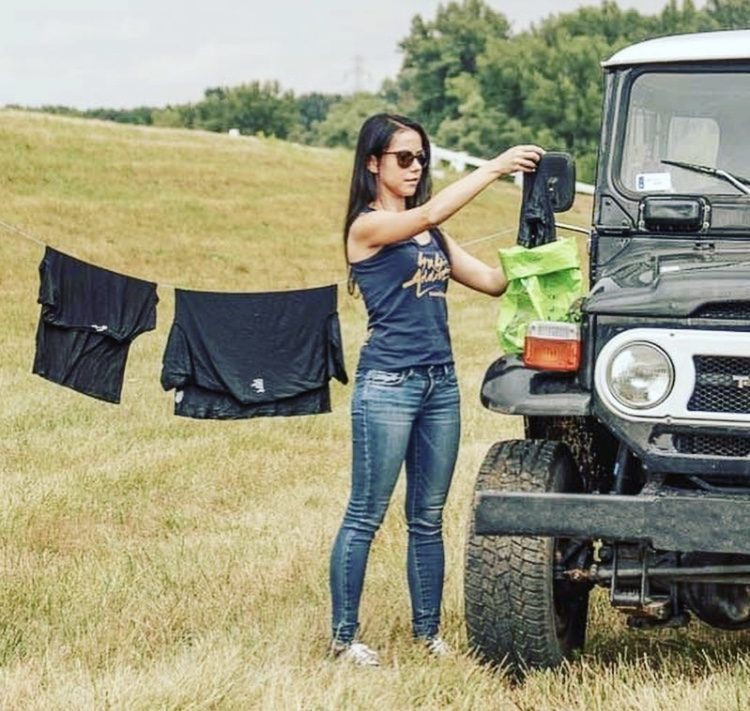
Keeping your clothes clean is also important when living in a van but is something else that is easiest when outsourced. So next, on our list of how to live off the grid in a van is clothes washing. Unless you have a massive van and amazing electrical system that can run a washing machine then the only real way to avoid the launderette when living on the road is by hand-washing. Hand washing isn’t the most exciting job but neither is going to the launderette, at least with hand washing you can be outside.
The Scrubba Wash Bag is a handy gadget that will make clothes washing easier when on the road. It is a waterproof bag with a ridged washboard inside that is super easy to do. Simply load with clothes, water and washing power, seal and give the clothes a good scrub. Rinse, squeeze and relax in the sun while they dry. If hand washing doesn’t work for all of your items then its good to be able to wash smaller pieces such as underwear, keeping you off grid (and away from the launderette) for longer .
How To Live Off The Grid – Using The Toilet
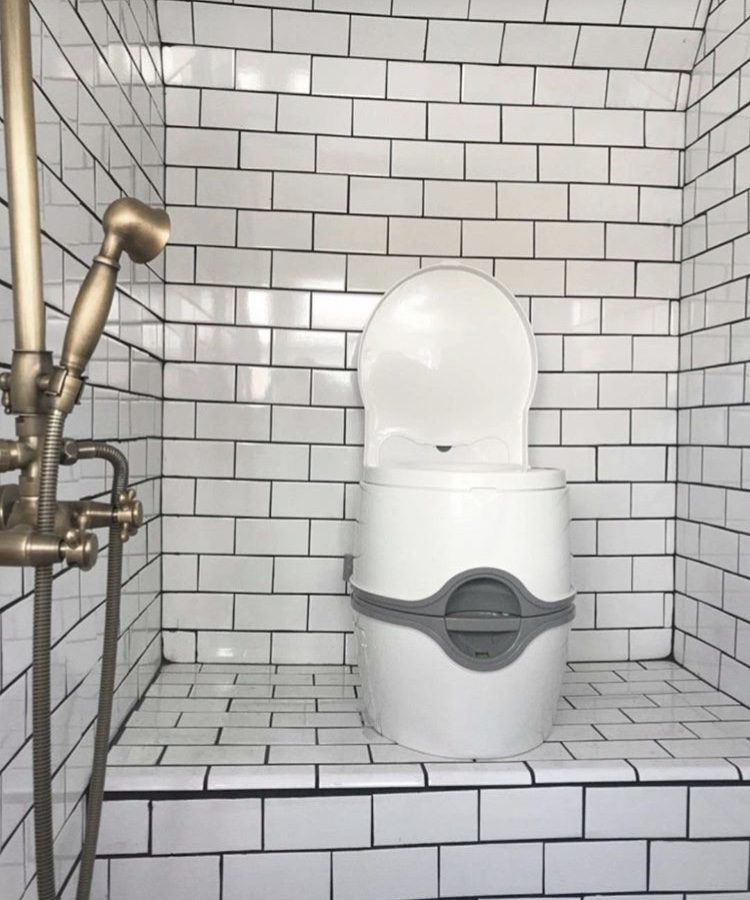
Next up on our list of how to live off the grid in a van is going to the toilet. Disposing of waste is difficult to do while trying to be off the grid, and is even morse difficult when you are constantly on the move. Using a porta poti, or relying on doing your business in nature or public toilets allows you to keep adventuring and be away from the grid for as long as possible but you are still relying on the grid to be able to dispose of your waste.
The best way to keep your toilet waste disposal off the grid is to invest in a composting toilet. A composting toilet turns your waste into soil that can be returned to nature and fertilise the ground. They also do not not need water or chemical to work so are better for the environment in this sense, compared to a chemical porta poti. On top of this they do not need to be emptied as frequently, allowing you to keep adventuring for longer.
How To Live Off The Grid – Cooking
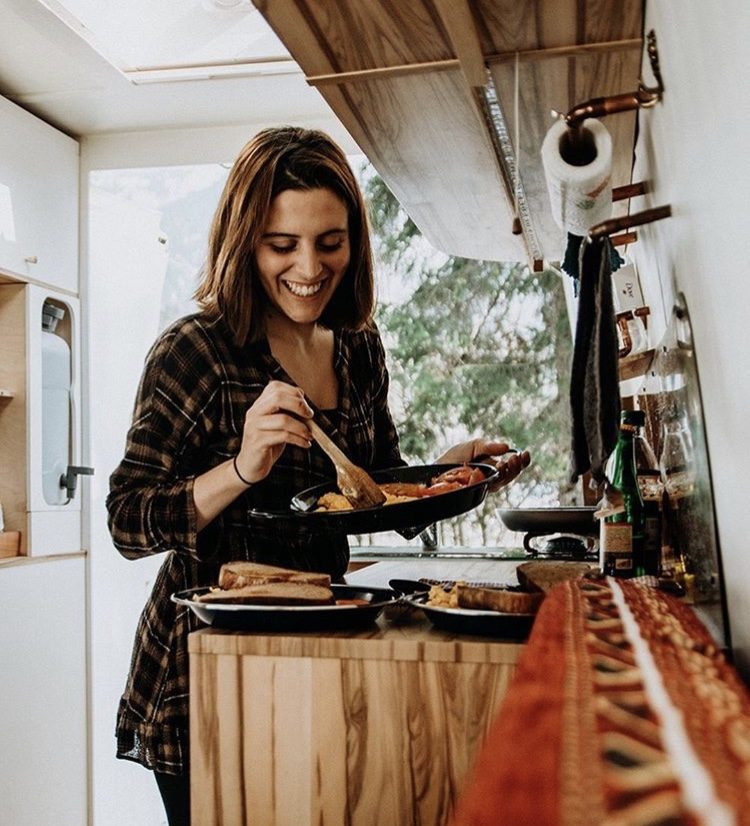
The final point on our list of how to live off the grid in a van is cooking. Most camper vans use gas such as butane or propane to fuel their hobs and ovens (if there is one). This will eventually need to be replaced or topped up. Opting for a larger gas canister means that this needs to be done less regularly so you can stay off the grid for longer.
If you want to not rely on the grid at all for your cooking system within your camper van you could opt for an electrical hob. This, paired with a solar electrical system means that all of your cooking would be off the grid. In order to do this you would need to be confident that you would get enough sun to power the hob as well as everything else in the van. if you would then this is a great way to keeping cooking off the gird.
Final Thoughts…
Hopefully you found our how to live off the grid in a van guide interesting and helpful and while it may not be possible to achieve all of these options, aiming for a couple will help reduce your carbon footprint and keep your adventure going for longer. Let us know what you think of life off grid by joining the Van Clan over on Facebook, Instagram and Twitter.



COMMENTS
Please note that all comments will be checked by our team before being approved.